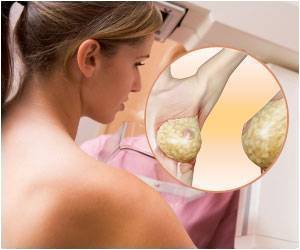Wondering whether combination therapy of estrogen and progestin better or worse than just giving women estrogen alone.

"This study showed that developing new breast tenderness after the start of hormone therapy was associated with increased breast cancer risk only in women on the combination estrogen plus progestin therapy, not estrogen therapy alone." said study first author Dr. Carolyn Crandall, a professor of general internal medicine and a scientist with UCLA's Jonsson Comprehensive Cancer Center
The study appears in the Nov. 17, 2011 in the early online edition of the peer-reviewed journal Breast Cancer Research and Treatment.
A previous study by Crandall, published last month, found that the new onset of breast tenderness was much more pronounced after initiation of estrogen and progestin therapy than in women getting estrogen therapy alone. The association between new onset breast tenderness and changes in breast density also was more pronounced in the women getting the combination hormone therapy.
"The consistent theme we've run across throughout these studies is that estrogen and progestin compared to estrogen alone have a more marked effect on breast tissue," Crandall said. "One theory is that there may be more growth of breast tissue, making the breasts more dense, when women take the combination therapy."
Multiple population studies have shown that higher breast density is associated with a higher risk of breast cancer. In women with extremely dense breasts, the cancer risk can be four to six times higher than for women whose breasts are not dense, Crandall said.
Advertisement
"We don't want to incite panic because breast cancer is rare in women taking hormone therapy, but the point is that women are terrified of getting breast cancer as a result of menopausal hormone therapy," Crandall said. "Where I think this study would be important is for women already on either combination hormone therapy or estrogen alone. If they do develop breast tenderness, it would be good for them to know the results of this study and to consider discussing them with their physician."
Advertisement
One finding in this study was expected, that estrogen and progestin has a greater impact on the breast and that women on the combination therapy had more breast tenderness than women on estrogen alone. What was surprising, Crandall said, was that women taking estrogen alone did have breast tenderness, but that didn't correlate to increased risk of breast cancer.
"It's intriguing to think the same symptom in two sets of women taking different hormone therapies could mean something different," Crandall said.
For this prospective study, Crandall and her team analyzed data from more than 27,337 women enrolled in the Women's Health Initiative (WHI). Of the 27,337 women, 16,608 were on the combination therapy, while 10,739 were taking estrogen alone. Launched in 1991, the WHI consisted of a set of clinical trials and an observational study involving161,808 healthy, postmenopausal women.
"These findings highlight the complexity inherent in the use of surrogate risk markers to assess menopausal hormone therapy-associated breast cancer risk," the study states.
Source-Eurekalert















